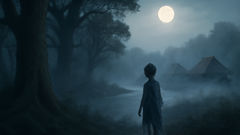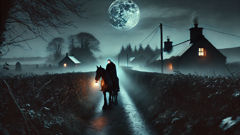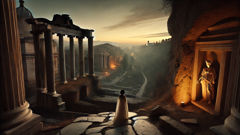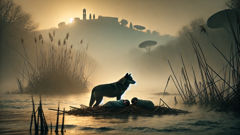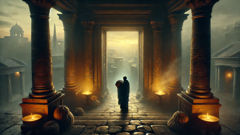Introduction
In the mist-shrouded valleys of medieval Serbia, where the forests pressed close against the thatched rooftops of villages and the Morava River wound like a silver serpent through the land, fear was often the first to greet the dusk. By day, the peasants worked their fields, their hands stained with the earth, their laughter carried on the wind. But when the sun dipped behind the western hills and shadows stretched long across the meadows, stories gathered like clouds. Whispers spoke of creatures that roamed after dark—beings neither living nor dead, born of sorrow and superstition. Among these, none chilled the blood quite like the Drekavac, the Screamer, said to be the restless soul of an unbaptized child. Some claimed to have heard its piercing wails echo across the marshes or glimpsed a gaunt, spectral figure weaving between ancient oaks. To many, it was a warning—of the dangers of neglect, of traditions left unfulfilled, and of the unspoken grief that could fester in the heart. Villagers clung to rituals meant to protect their homes: crosses over doors, whispered prayers, salt at thresholds. For the Drekavac was more than a tale to frighten children. It was a shadow at the edge of memory, a reminder of loss and the thin veil between the world of the living and the restless dead. In one such village, tucked into a crook of the Morava and bordered by whispering woods, a single tragedy would awaken the ancient fears, setting in motion a story that would be retold for generations—a story of grief, guilt, and the possibility of forgiveness.
Whispers by the River
The village of Dubravka was a patchwork of modest wooden cottages, rough-hewn fences, and fields that rolled down toward the Morava’s silvery banks. It was a place both beautiful and harsh, where each day was a battle against nature’s moods. Wheat and barley swayed in the wind, while smoke from hearth fires curled skyward at dusk. The villagers lived simply, bound together by custom and necessity, wary of strangers and even more of the unknown.
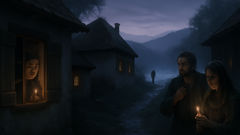
The heart of Dubravka was its church, a squat stone building topped with a wooden cross. Here, Father Nikodim tended his flock with equal parts sternness and compassion. He was old, his beard as white as the winter snow, his back bent by decades of labor and prayer. Yet his eyes still burned with a light that saw beyond the surface—a man respected, but also feared, for his knowledge of both scripture and old, darker things.
It was in early spring, when the river began to swell with snowmelt, that tragedy struck the home of Jovan and Milena. Their firstborn son, Petar, a child of only seven summers, had fallen ill. A fever took him swiftly, leaving his small body cold before Father Nikodim could be summoned to perform the baptism that had been postponed for want of a proper feast. The sorrow in their home was profound, the kind that settled into the bones and would not be washed away by tears.
Villagers came bearing bread, honey, and stories. Some whispered that the fever was a punishment for neglecting the ancient rites; others pressed amulets into Milena’s trembling hands and urged her to pray. But grief was a solitary country, and Jovan wandered it in silence, his shoulders stooped, his eyes hollow.
The burial was hurried, performed at dusk, with only the family and Father Nikodim in attendance. The grave was dug at the edge of the churchyard, just outside consecrated ground—a quiet acknowledgment that Petar had died unbaptized. As the last clod of earth was pressed over the tiny mound, a cold wind swept down from the river. Milena clung to her husband, her wails twisting into the night, as if refusing to let go of the world.
That evening, as the villagers gathered behind shuttered windows, a sound split the darkness—a cry that was neither animal nor human. It rose from the riverbank, sharp and sorrowful, echoing across the fields. Dogs cowered. Mothers drew their children close. Some muttered prayers; others pressed salt across their thresholds. Jovan and Milena lay sleepless in their hut, listening to the wind and wondering if grief alone could make the world howl.
The Night Screamer
Over the following nights, the cries grew bolder. At first, they came only at the hour when the moon crested above the pines—a single, shattering wail that faded into ragged sobs. Then, as the days passed, the Screamer’s voice rang out earlier and lingered longer, circling the village like a wolf seeking entry. Some said it was Petar’s spirit, denied rest for want of baptism. Others insisted it was an ancient evil, feeding on loss.
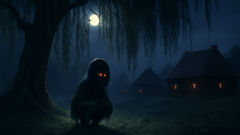
Children were forbidden from venturing out after dark. Grown men carried iron knives tucked in their belts or wore garlic on cords around their necks. Women sprinkled holy water at windowsills and drew crosses on their doors with charcoal. Even Father Nikodim, who’d faced down years of famine, plague, and war, found his prayers laced with unease.
On the seventh night after Petar’s burial, Jovan heard a faint scratching at the door—softer than a rat, but insistent. Milena whimpered in her sleep. Jovan rose, clutching a heavy branch, and pushed open the door. The night air was cold and thick with fog. At the edge of their yard, near the willow tree where Petar had once played, a figure hunched. It was small—no larger than a child—and its shape flickered in the gloom. Jovan’s heart hammered in his chest as he called out, voice trembling: “Who’s there?”
The figure straightened. Eyes like burning coals fixed on him from beneath a tangled mass of hair. Its mouth gaped wide, and from it came a shriek so piercing that Jovan staggered back, dropping his makeshift club. The figure turned and slipped into the trees, its cries trailing behind.
At dawn, Jovan went to Father Nikodim. His voice was raw, and his hands shook as he recounted what he’d seen. The priest listened in silence, brow furrowed. When Jovan finished, Nikodim placed a hand on his shoulder and whispered, “The Drekavac comes when the bonds between worlds are thin. Your son’s soul cries for peace. There may yet be a way.”
Word spread quickly through Dubravka. Some scoffed at Jovan’s tale, dismissing it as the fever dream of a grief-maddened man. Others nodded in grim agreement—there were stories, after all, of spirits denied rest for lack of sacred rites. The villagers grew anxious. Cattle fell sick, chickens refused to lay, and a thick fog hung stubbornly over the fields. At night, the Drekavac’s screams grew louder, joined by the whispering of wind through broken branches and the creak of doors swinging in the dark.
A council was called in the church’s shadow. Women wept openly; old men muttered about debts owed to the dead. Father Nikodim spoke at last: “If the child’s soul cannot find rest, it is our duty to guide him. We must finish what was left undone.” The villagers nodded, relief and fear mingling in their eyes.
The Ritual of Forgiveness
Preparations began at once. Father Nikodim instructed Jovan and Milena to fast and pray, purifying themselves for the rite. The women of Dubravka sewed a tiny white shroud, embroidered with crosses and blue thread—symbols of innocence and hope. The men carved a new wooden cross, rough but sturdy, to plant beside Petar’s grave.
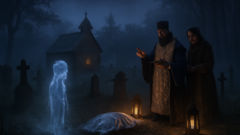
The ritual would be held at midnight, when the veil between worlds was thinnest. All day, the village moved with quiet urgency. Bread was baked and set aside for the hungry dead. Candles were blessed and placed in lanterns to ward off wandering spirits. Even the most skeptical among them dared not shirk their tasks; none wished to invite the Drekavac’s wrath.
As darkness fell, Jovan and Milena walked to the edge of the churchyard, where Petar’s grave lay just beyond consecrated ground. Father Nikodim met them, his vestments glimmering in lantern light. The villagers gathered at a respectful distance, faces drawn and pale. Above them, clouds parted to reveal a thin sliver of moon.
The priest began to chant, voice deep and unwavering. He sprinkled holy water over the grave, recited the prayers of baptism and forgiveness, and laid the new shroud over the mound. Jovan and Milena knelt beside him, tears streaming down their faces as they whispered Petar’s name. The wind rose, swirling dust and petals through the air. Somewhere in the forest, an owl called—a low, mournful note.
As the prayers reached their crescendo, a chill swept through the crowd. A thin mist curled over the grave. Then, from the shadows beneath the trees, the Drekavac appeared—its form clearer than before. It stepped hesitantly into the lantern light: small, gaunt, its eyes wide with longing. The villagers gasped but held their ground. Father Nikodim extended his hand, voice trembling only slightly as he spoke: “Child of sorrow, you are not forgotten. By water and word, be at peace.”
For a heartbeat, all was still. Then the Drekavac released a cry—no longer one of agony, but of relief. Its form shimmered, growing fainter with each passing moment. As the final prayer was spoken, it faded like breath on glass, leaving only silence and the faint scent of wildflowers in its wake.
Jovan and Milena collapsed into each other’s arms, their grief eased but not erased. The villagers returned to their homes in reverent silence, hearts heavy but hopeful. That night, for the first time in a week, no cries echoed across the Morava’s banks.
Conclusion
The legend of the Drekavac lingered long after peace returned to Dubravka. Parents whispered its warnings to children on stormy nights. Some insisted they still heard faint cries on the wind, or glimpsed pale shapes darting between moonlit trees. Yet most believed that Petar’s soul had finally found rest, and that compassion—more than ritual—had healed what was broken.
Jovan and Milena’s sorrow softened into memory, marked each spring by a small wreath of wildflowers on Petar’s grave. Father Nikodim continued to guide his flock, teaching that every soul deserved dignity and remembrance. The villagers grew gentler in their judgments, more mindful of rituals not as mere habits but as acts of love. And while fear of the Drekavac remained—a shadow lurking at the edge of every firelit tale—it no longer ruled their hearts.
The story passed from parent to child, a caution and a comfort. In it lay not only the terror of what might return when grief is left untended, but also hope—that through forgiveness and kindness, even the most restless spirit can be brought home. Thus, along the banks of the Morava and in the hush of Serbian forests, the Drekavac lived on: not only as a Screamer in the night, but as a whisper of mercy in the face of loss.

